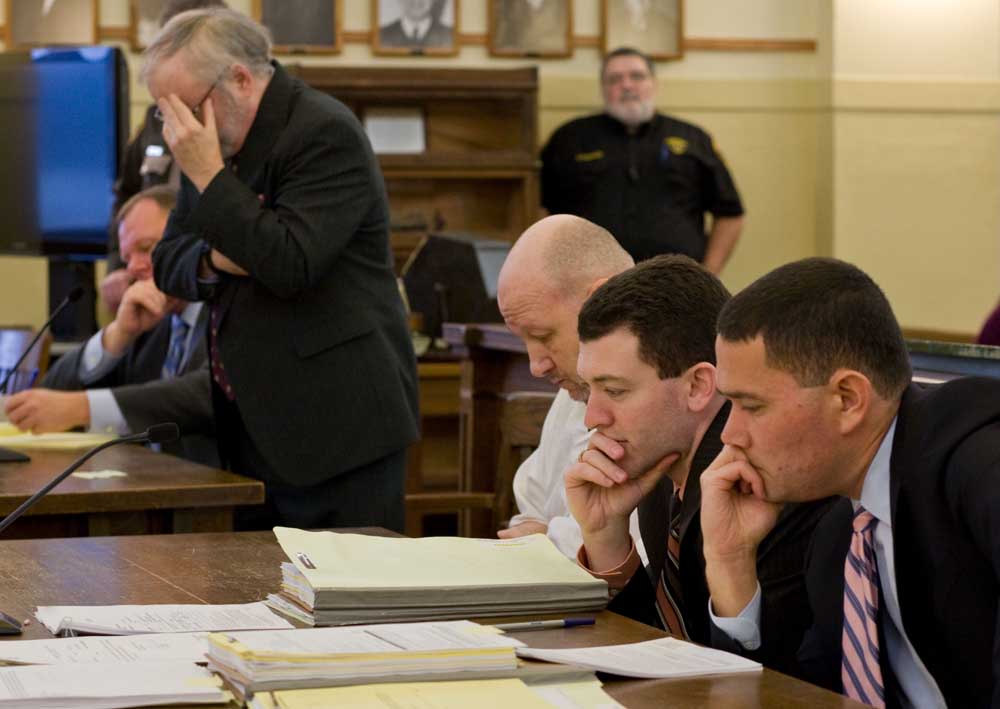Court tosses exceptional murder sentence
Published 10:03 am Thursday, July 2, 2015

- Brian Brush, center with bald head, sat with his attorneys in the Pacific County Courtroom during his original sentencing in February 2012. He will be heading back to court for reconsideration of that sentence following a Washington State Supreme Court decision Thursday.
OLYMPIA, Wash. — The Washington State Supreme Court has ruled that the state Court of Appeals made the right decision in May 2014 when it threw out convicted murderer Brian Brush’s exceptional 88-year sentence. In an opinion filed Thursday, a panel of four justices concluded that by providing jurors with guidance about how to evaluate the case, the Pacific County Superior Court violated a rule that prohibits judges from commenting on evidence.
Trending
That decision means that Brush is still guilty of first-degree murder, but Pacific County will have to hold the sentencing phase of his trial again. And Brush — who has been serving his sentence in the Washington State Penitentiary in Walla Walla — will have to return to Pacific County until his fate has been decided again.
The ruling “… is manifestly unfair to the victim and her family, and an appalling miscarriage of justice,” Pacific County Prosecutor Mark McClain said in an email Thursday. “Mr. Brush received an appropriate sentence for his actions the first time around and now this family has to be put through this again. Simply tragic.”
McClain said the county has two options. First, prosecutors could try to sentence Brush to something in the standard sentencing range for first-degree murder with a firearm. That would result in a sentence of somewhere between 25 and about 31 years, minus time served. Second, the prosecutors could again try to convince the judge that Brush deserves an exceptional sentence.
Trending
McClain said he has spoken briefly with the victim’s family. He plans to talk with them again and do more research before deciding which option to pursue.
On Sept. 11, 2009, Roseburg businessman and former police officer Brian Brush shot his ex-fiancée, Lisa Bonney, four times with a shotgun. The shooting occurred on the Long Beach boardwalk, in full view of three visiting police officers and other witnesses. Brush was arrested immediately and convicted of first-degree murder and several “aggravating factors” during the subsequent trial.
During sentencing, prosecutors argued that Brush should get extra time because the crime was a case of aggravated domestic violence. Judge Michael Sullivan sentenced Brush to 83 years in prison, with an additional 5 years tacked on for a “firearm enhancement.”
In order to convict Brush of aggravated domestic violence, the jury had to find that the killing was part of an ongoing pattern of abuse that involved “multiple incidents over a prolonged period of time.”
Before the jurors went into deliberation, Sullivan provided them with excerpts from a widely used document called the “Washington Pattern Jury Instructions” that helps jurors understand how trials work and how to perform their duties. The instructions explained that “‘prolonged period of time’ means more than a few weeks.”
Even though the instructions are written and approved by a panel of respected defense attorneys, prosecutors and judges — including a state Supreme Court justice — the trial court’s attempt to provide clarity for the jurors ended up invalidating the sentence.
Brush appealed to the state Court of Appeals on several grounds. In 2014, the appeals court rejected most of his arguments, but agreed that Sullivan could have influenced the jurors’ decisions by providing the instructions.
In response, the state asked the Supreme Court to review the appeals court decision. The Supreme Court accepted the case and heard arguments in January.
According to the opinion Thursday, “The instruction defining ‘prolonged period of time’ essentially resolved a factual question for the jury and thereby constituted an improper comment on evidence.”
In Washington state, the standard sentencing range for a person convicted of first-degree murder is 240 to 320 months in prison. But Sullivan believed he was permitted to impose an exceptionally severe sentence because the jury determined there were three “aggravating factors.” They are: deliberate cruelty toward the victim during the crime, aggravated domestic violence, and inflicting injuries that exceeded the level of bodily harm typically associated with the offense.
During the hearing, Bonney’s family members repeatedly emphasized that the long sentence was one of few small consolations in a terrible ordeal.
Speaking to Judge Sullivan, Bonney’s father, Gene Klingler, said, “I want him behind bars without parole so that every day of his life he will remember what he did.”
Brush, 47 at the time of the murder, spent about three months in Pacific County Jail before being transferred to await his trial in a Washington State Prison near Shelton in January 2010. So far, he has served about 70 months behind bars. Before the Court of Appeals ruling, he was theoretically due for release no later than 2097, at the unattainable age of 135. This amounted to a life sentence.
Unless one or more of the aggravating factors is re-established by the Washington Supreme Court, Brush’s sentence would likely be reduced to no more than 320 months — 26 years and 8 months — with credit for time already served. In addition, in Washington state inmates typically receive one-third off their sentences for “good time” — time served without major disciplinary problems. Taking all this into consideration, he could end up being released at the age of about 65, if he is sentenced to the top end of the standard range and has avoided problems in prison.









